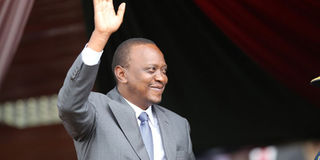Stability and reconciliation can only be assured if there is justice for the victims

President Uhuru Kenyatta waving to Kenyans during Mashujaa Day celebrations at Nyayo Stadium on October 20, 2104. In his Mashujaa Day speech, President Uhuru Kenyatta termed the International Criminal Court “a threat to Kenya’s stability” and reconciliation. PHOTO | BILLY MUTAI
What you need to know:
- Against this background, it is difficult to comprehend the President’s pledge that the government would continue to support the victims to resume normal life and obtain justice.
- And any reconciliation founded on a process that systematically avoids accountability is founded on quicksand; it is a time bomb waiting to explode.
- It is regrettable that both the Director of Public Prosecutions and the Attorney General have said that there is no sufficient evidence to commence prosecutions domestically.
In his Madaraka Day speech, President Uhuru Kenyatta termed the International Criminal Court “a threat to Kenya’s stability” and reconciliation.
As a person who until only a few days ago was subject to the power of the ICC, the President may have had his reasons for venting his anger on the court.
I believe the court has, in fact, enhanced stability in the country, if the violence-free 2013 general elections are anything to go by.
The single most important factor in delivering stability is the ultimate possibility that those who incite violence, hate speech, and other forms of negative ethnicity could end up at The Hague.
The International Criminal Court was established to put an end to impunity where domestic systems fail to do so.
In my view, it does not have to do so within the confines of the courtroom for it to be considered effective in this fight.
The fact that the judicial processes have been commenced against sitting heads of State and some cases are ongoing are pointers to how far the court is prepared to go in the fight against impunity.
The President lamented that the ICC “offers no clear promise of justice for the victims of post-election violence”.
GREATEST OBSTACLE
How can it when the government stops at nothing to frustrate the search for truth and justice in the judicial process?
Earlier in the year, the government vehemently opposed the ICC prosecutor’s request to the court for witnesses who had recanted their statements to be compelled to testify.
The Trial Chamber ultimately found that such witnesses were compellable, and the Appeals Chamber of the ICC reconfirmed this position. The ICC has also found that the government has consistently failed to adequately facilitate the work of the Court and only fell short of reporting Kenya as a State Party to the Assembly of State Parties.
Against this background, it is difficult to comprehend the President’s pledge that the government would continue to support the victims to resume normal life and obtain justice.
It is difficult for victims to lead a normal life when the government continues to discriminate against those from certain regions when providing assistance to victims of the post-election violence.
It is equally difficult for victims to find justice when the government is the single greatest obstacle to having witnesses appear before the ICC to testify.
Justice also cannot be seen to be done when the same government is behind calls for the withdrawal of charges against the accused persons in the remaining case.
Nor can the victims be expected to resume normal life when the government blocks and frustrates attempts to identify and freeze assets that may be applied towards providing reparations for victims.
For there to be a meaningful pledge of justice for the victims, the government must pursue those responsible for the murder of more than 1,300 Kenyans and the persecution and displacement of up to 650,000 others.
In short, justice has to be the product of a judicial process for accountability and cannot be said to exist when there is no process undertaken for holding people accountable.
A LITTLE TOO LATE
And any reconciliation founded on a process that systematically avoids accountability is founded on quicksand; it is a time bomb waiting to explode.
It is regrettable that both the Director of Public Prosecutions and the Attorney General have said that there is no sufficient evidence to commence prosecutions domestically.
Can this possibly be true? Those who killed and those who displaced others still live in our midst.
Well, at least this is what the victims I represent tell me. I, therefore, refuse to believe that it is too late for accountability.
If the government was truly interested in bringing to book the perpetrators of the violence, all it needs to do is to rededicate itself to fresh, and genuine, investigations and assure would-be witnesses of adequate protection.
Indeed, the greatest threats to Kenya’s stability are, first, the government’s attempt at reconciliation without a solid substratum, second, its refusal to conduct genuine investigations and prosecutions against the perpetrators of the post-election violence, third, favouritism towards victims from certain ethnic communities, and fourth, the government’s failure to cooperate adequately with the ICC.
Mr Nderitu is the Common Legal Representative for Victims at the ICC in The Prosecutor vs William Samoei Ruto and Joshua arap Sang.




